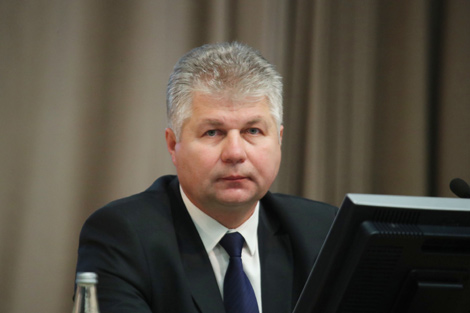Opinions & Interviews
Generations and Gender survey seen as valuable tool for development of demographic policy in Belarus

MINSK, 21 March (BelTA) - The results of the large-scale Generations and Gender survey will be a valuable tool for the development of the national demographic policy in Belarus, Belarus’ Deputy labor and Social Security Minister Alexander Rumak said at a press conference of the regional symposium on the development of science-based family policy, BelTA has learned.
“The country's population policy is not chaotic. Before you craft any measures and take decisions, you need to study the demographic processes and compare them with the processes in the neighboring countries in the European region,” Alexander Rumak said. He added that a number of measures that have been adopted have yielded the positive effect. For example, since 2015 when the family capital program was launched in Belarus the number of third and subsequent births has increased from 16,500 to 22,200 in Belarus. “Thanks to the survey we will be able to assess the family support measures currently in force and to understand what to do next to stimulate the families to have a second child,” Alexander Rumak said.
The national sociological survey “Belarus: family structure, family relations and birthrate in the changing social and economic context” was conducted in May-November 2017 with the use of the Generations and Gender program methodology. The survey was part of the international technical assistance project to support Belarus’ National Demographic Security Program. A total of 10,000 people aged 18-79 were polled in 56 cities and 40 rural councils of Belarus. The questionnaire had more than 200 questions. It is expected that the Labor and Social Security Ministry and the UNFPA will sign an agreement on the use of the data. The results will be a valuable tool in improving the demographic policy in Belarus. Apart from the survey, Belarus has established cooperation with international researchers, has built a system of professional development and demographic knowledge for civil servants of different levels, and training of young demographic specialists.
Minsk played host to the symposium to discuss the development of the science-based family policy “Application of the results of the UNECE Generations and Gender survey” on 21-22 March. The event was organized by the UNFPA, UNECE, and the Belarusian government. The goals of the forum of experts from Belarus, Russia, Austria, the Netherlands, Czechia, Estonia, Lithuania, and Latvia was to strengthen ties between scientists and strategy developers, government bodies and other stakeholders.







 print version
print version make home page
make home page add to bookmarks
add to bookmarks

